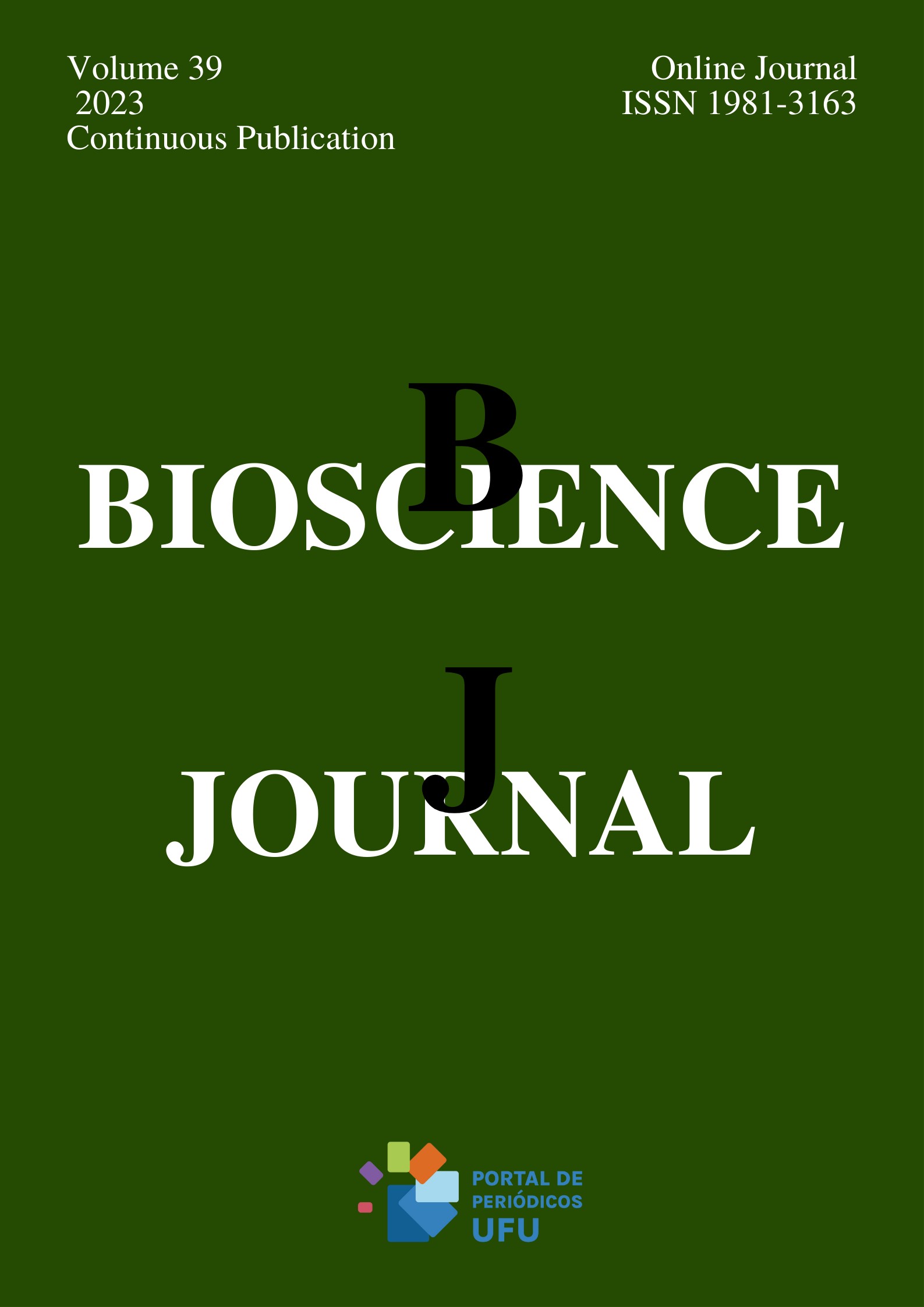Screening of lysine production by Escherichia coli and Klebsiella isolates at different carbon sources
DOI:
https://doi.org/10.14393/BJ-v39n0a2023-60568Palavras-chave:
Bacterial Isolates, Fermentation Media, Fermentative Production of Lysine.Resumo
Lysine is an essential amino acid that is not biologically manufactured in the body. Different chemical methods for lysine production are expensive and give low yields. The present study was conducted with the purpose to evaluate the biochemical production of lysine by different carbon sources using bacterial isolates. Three carbon sources namely glucose, sucrose, and fructose were used to evaluate the biochemical production of lysine by Escherichia coli and Klebsiella spp. isolates. Optimum incubation periods were between 48-96 hours. An extensive amount of lysine was produced by all of these isolates in L6 fermentation medium. Maximum lysine was produced by Klebsiella isolate K1 6.48 g/L after 96 hours of incubation by using glucose as carbon source followed by 6.0 g/L by Klebsiella isolates K3 after 72 hours of incubation when sucrose was used as a carbon source at 37 °C. Highest amount of lysine was produced at 96 hours by Klebsiella isolates in addition to E. coli. From all three carbon sources using Klebsiella isolates and E. coli, glucose showed better lysine production.
Downloads
Referências
ANASTASSIADIS, S. L-Lysine Fermentation. Recent Patents on Biotechnology. 2007, 1, 11-24. https://doi.org/10.2174/187220807779813947
EKWEALOR, I.A. and OBETA, J.A.N. Studies on lysine production by Bacillus megaterium. African Journal of Biotechnology. 2005, 4(7), 633-638. https://doi.org/10.5897/AJB2005.000-3115
HUDAIB, T., BROWN, S. and WILSON, D. Identification of free amino acids in several crude extracts of two legumes using thin-layer chromatography. Journal of Planar Chromatography.2016, 29(2), 145–147. https://doi.org/10.1556/1006.2016.29.2.9
HUSSAIN, A. Enhanced production of l-lysine from bacterial species through metabolic and bioprocess engineering. Thesis of Doctor of Philosophy in the Subject of Biotechnology, 2013.
KIEFER, P., HEINZLE, E. and WITTMANN C. Influence of glucose, fructose and sucrose as carbon sources on kinetics and stoichiometry of lysine production by Corynebacterium glutamicum. Journal of Industrial Microbiology and Biotechnology. 2002, 28(6), 338-343. https://doi.org/10.1038/sj/jim/7000252
LANGE, A., et al. Bio-based succinate from sucrose: High-resolution13C metabolicfluxanalysis and metabolic engineering of the rumen bacteriumBasfiasucciniciproducens. Metabolic Engineering. 2017, 44, 198-212. https://doi.org/10.1016/j.ymben.2017.10.003
LEINONEN, I., et al. Lysine supply is a critical factor in achieving sustainable global protein economy. Frontiers in Sustainable Food Systems. 2019, 3, 1-11. https://doi.org/10.3389/fsufs/2019.00027
LEUCHTENBERGER, W., HUTHMACHER, K. and DRAUZ, K. Biotechnological production of amino acids and derivatives: current status and prospects. Applied Microbiology and Biotechnology. 2005, 69, 1-8. https://doi.org/10.1007/s00253-005-0155-y
LIM, Y.H., et al. Optimized medium via statistical approach enhanced threonine production by Pediococcus pentosaceus TL-3 isolated from Malaysian food. Microbial Cell Factories. 2019, 18, 125. https://doi.org/10.1186/s12934-019-1173-2
JIE L.V., et al. Isolation and molecular identification of auxotrophic mutants to develop a genetic manipulation system for the Haloarchaeon natrinema sp. J7-2. Archaea. 2015, 483194. https://doi.org/10.1155/2015/483194
NADEEM, S., et al. Enhanced L-Lysine Production by an Escherichia coli Mutant WARN 30522 after MNNG Treatment. International Journal of Agriculture & Biology. 2001, 3(4), 448-450.
NELOFER, R., et al. L-lysine production by the homoserine auxotrophic mutant of Corynebacterium glutamicum in stirrer fermenter. Pakistan Journal of Zoology. 2007, 39(3), 159-164.
NKHATA, S.G., et al. Fermentation and germination improve nutritional value of cereals and legumes through activation of endogenous enzymes. Food Science & Nutrition. 2018, 6(8), 2446-2458. https://doi.org/10.1002/fsn3.846
RAO, B.S., MURALIDHARARAO and SWAMY, A.V.N. Studies on continuous production kinetics of L-Lysine by immobilized Corynebacterium glutamicum 13032. Middle-East Journal of Scientific Research. 2011, 7(2), 235-240.
SHAH, A.H., HAMEED, A. and KHAN, G.M. Fermentative Production of L-Lysine: Bacterial Fermentation-I. Journal of Medical Sciences. 2002, 2, 152-157. https://doi.org/10.3923/jms.2002.152.157
SIEDLER, S., et al. Reductive whole-cell biotransformation with Corynebacterium glutamicum: improvement of NADPH generation from glucose by a cyclized pentose phosphate pathway using pfkA and gapA deletion mutants. Applied Microbiology and Biotechnology. 2013, 97(1), 143-152. https://doi.org/10.1007/s00253-012-4314-7
SITANGGANG, A.B., et al. Fermentation Strategies: Nutritional Requirements. In: KRAUSE, J. and FLEISCHER, O. Industrial Fermentation: Food Processes, nutrient sources and production strategies, 2010.
VITORINO, L.C. and BESSA, L.A. Technological microbiology: development and applications. Frontiers in Microbiology. 2017, 8, 827. https://doi.org/10.3389/fmicb.2017.00827
Downloads
Publicado
Como Citar
Edição
Seção
Licença
Copyright (c) 2023 Nagina Gilani, Tahira Maqbool, Muhammad Mohibullah, Ume Habiba, Tauseef Anwar, Huma Qureshi

Este trabalho está licenciado sob uma licença Creative Commons Attribution 4.0 International License.






